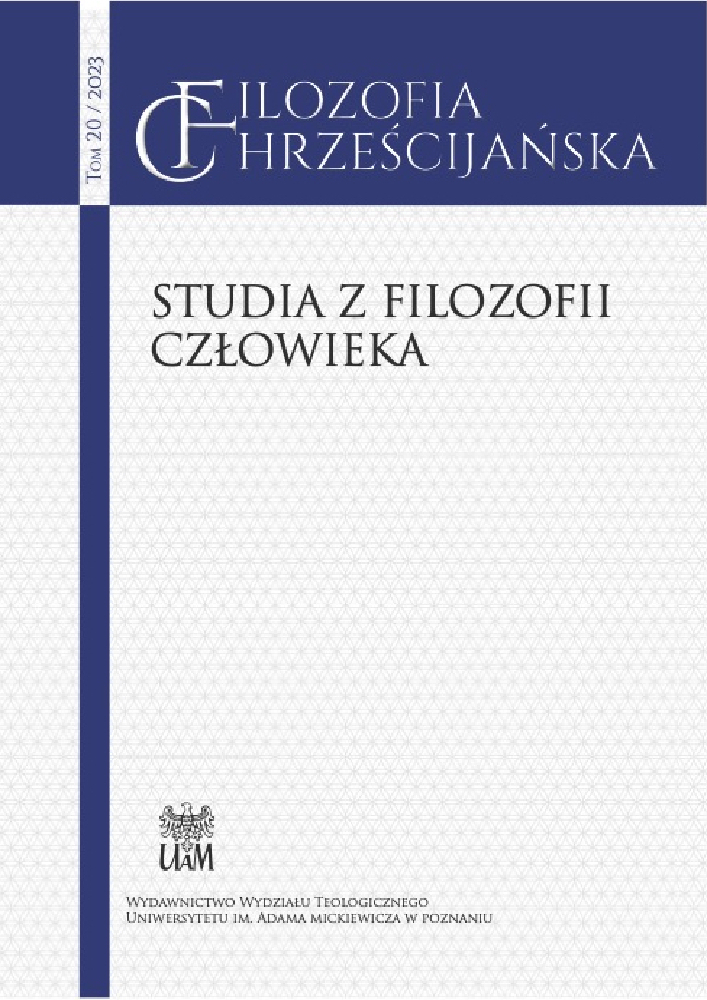Abstract
The purpose of this article is to trace the essential foundations of the reduction carried out by young Heidegger, whereby the most primordial experience of life emerges from religious experience. The considerations presented below consistently follow the path described above leading back to the thing itself, that is, precisely back to life itself. Hence, we will not be interested here simply in the religious thinking of the young Heidegger, nor in his relation to the problem of God. Instead, we will try to reconstruct his path back towards life itself. This article admittedly focuses on Heidegger’s early philosophical explorations. It seems, however, that Heidegger remains faithful to the very end to the ambitious goals set by the inconspicuous schema for the Kriegsnotsemester lecture of 1919, outlined with youthful enthusiasm for the search for real life. It is hard to resist the impression that the whole long path of his thinking is just such a constant return to life.
References
Buren J. van, The Earliest Heidegger: a New Field of Research, in: A Companion to Heidegger, eds. H.L. Dreyfus and M.A. Wrathall, Oxford 2005, pp. 19-31. DOI: https://doi.org/10.1111/b.9781405110921.2004.00004.x
Buren J. van, The Young Heidegger: Rumour of the Hidden King, Bloomington 1994.
Dilthey W., Das Wesen der Philosophie, in: Gesammelte Schriften, Bd. 5, Lepizig–Berlin 1924.
Dilthey W., Die Typen der Weltanschauung und ihre Ausbildung in den metaphysichen Systemen in: Gesammelte Schriften’, Bd. 8, Lepizig–Berlin 1931.
Dilthey W., Einleitung in die GeisteswissenschaftenVersuch einer Grundlegung für das Studium der Gesellschaft und der Geschichte, Berlin 1922.
Dreyfus H.L., Being-in-the-World: A Commentary on Heidegger’s Being and Time, Division I, Cambridgen 1990.
Edwards P., Heidegger and Death as a ‘Possibility’, „Mind” 84(1) 1975, p. 546-66. DOI: https://doi.org/10.1093/mind/LXXXIV.1.548
Galarowicz J., Martin Heidegger: genius thinker or shaman, Kraków 2014.
Heidegger M., Gesamtausgabe 2. Abt. Bd. 56/57: Zur Bestimmung der Philosophie 1. Die Idee der Philosophie und das Weltanschauungsproblem (1919) 2. Phänomenologie und transzendentale Wertphilosophie (1919), Klostermann, Vittorio; 2., durchges. u. erg. edition (31 Dec. 1999), Berlin 1999.
Heidegger M., Kant and the problem of metaphysics, Bloomington [USA, Indiana] 1990.
Heidegger M., The idea of philosophy and the problem of worldview, in: M. Heidegger, Towards the definition of philosophy, transl. T. Sadler, London 2000, p. 1-99.
Heidegger M., The phenomenology of religious life, Bloomington [USA, Indiana] 2004.
Heidegger M., Towards the definition of philosophy, transl. T. Sadler, London 2000.
Jagiełło J., Martin Hediegger: thinking meta-physically, in: S. Janeczek, A. Starościc, Metaphysics, Part 1: Concepts of metaphysics, Lublin 2017.
Kisiel T., The Genesis of Heidegger’s «Being and Time», Berkeley 1993. DOI: https://doi.org/10.1525/9780520916609
Michalski K., Heidegger and contemporary philosophy, Warsaw 1978.
Mizera J., Towards a non-metaphysical philosophy. Martin Heidegger’s road to other thinking, Cracow 2006.
Mulhall S., Routledge Philosophy Guidebook to Heidegger and ‘Being and Time’, London 2002. DOI: https://doi.org/10.4324/9780203196557
Payen G., Martin Heidegger, catholicisme, revolution, nazisme, Paris 2016. DOI: https://doi.org/10.3917/perri.payen.2016.01
Pöggeler O., Martin Heidegger’s Path of Thinking, transl. by D. Magurshak and S. Barber, New Jersey 1963.
Polt R., Heidegger: an Introduction, London 1999.
Reading Heidegger from the Start: Essays in His Earliest Thought, eds. T. Kisiel and J. van Buren, Albany 1994.
Stachewicz K., Martin Heidegger’s thinking of God, in: S. Janeczek, A. Starościc, Philosophy of God, Part 1: The Search for God, Lublin 2017.
The Cambridge Companion to Heidegger, ed. C. Guignon, Cambridge 1993.
Vedder B., Heidegger’s philosophy of religion. From God to the Gods, Pittsburgh 2006.
Wrathall M., How to Read Heidegger, London 2003.
License
Copyright (c) 2023 Przemysław Zgórecki

This work is licensed under a Creative Commons Attribution-NoDerivatives 4.0 International License.
Autorzy
Autorzy tekstów przyjętych do publikacji w czasopiśmie Filozofia Chrześcijańska są zobowiązani do wypełnienia, podpisania i odesłania na adres redakcji umowy o udzielenie nieodpłatnej licencji do utworów, z zobowiązaniem do udzielania sublicencji CC.
Zgodnie z umową, autorzy tekstów opublikowanych w czasopiśmie Filozofia Chrześcijańska udzielają Uniwersytetowi im. Adama Mickiewicza w Poznaniu niewyłącznej i nieodpłatnej licencji oraz zezwalą na użycie sublicencji Creative Commons Attribution-NoDerivatives 4.0 International (CC BY-ND 4.0).
Autorzy zachowują prawa do dalszego, swobodnego rozporządzania utworem.
Użytkownicy
Zainteresowani użytkownicy internetu uprawnieni są do korzystania z utworów opublikowanych od 2015 roku w Filozofia Chrześcijańska pod następującymi warunkami:
- uznanie autorstwa - obowiązek podania wraz z rozpowszechnionym utworem, informacji, o autorstwie, tytule, źródle (odnośniki do oryginalnego utworu, DOI) oraz samej licencji;
- bez tworzenia utworów zależnych - utwór musi być zachowany w oryginalnej postaci, nie można bez zgody twórcy rozpowszechniać np. tłumaczeń, opracowań.
Do wszystkich tekstów opublikowanych przed 2015 r. prawa autorskie są zastrzeżone.
Inne
Uniwersytet im. Adama Mickiewicza w Poznaniu zachowuje prawo do czasopisma jako całości (układ, forma graficzna, tytuł, projekt okładki, logo itp.).

